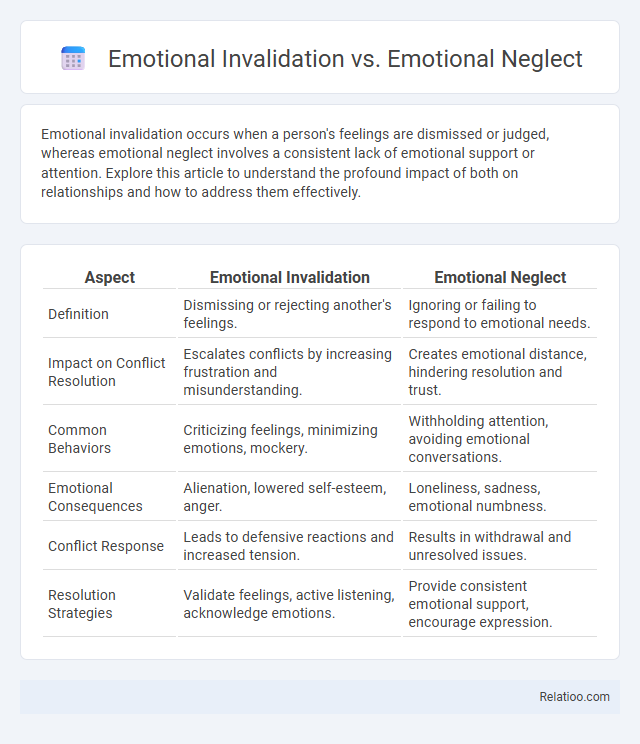Emotional invalidation occurs when a person's feelings are dismissed or judged, whereas emotional neglect involves a consistent lack of emotional support or attention. Explore this article to understand the profound impact of both on relationships and how to address them effectively.
Table of Comparison
| Aspect | Emotional Invalidation | Emotional Neglect |
|---|---|---|
| Definition | Dismissing or rejecting another's feelings. | Ignoring or failing to respond to emotional needs. |
| Impact on Conflict Resolution | Escalates conflicts by increasing frustration and misunderstanding. | Creates emotional distance, hindering resolution and trust. |
| Common Behaviors | Criticizing feelings, minimizing emotions, mockery. | Withholding attention, avoiding emotional conversations. |
| Emotional Consequences | Alienation, lowered self-esteem, anger. | Loneliness, sadness, emotional numbness. |
| Conflict Response | Leads to defensive reactions and increased tension. | Results in withdrawal and unresolved issues. |
| Resolution Strategies | Validate feelings, active listening, acknowledge emotions. | Provide consistent emotional support, encourage expression. |
Understanding Emotional Invalidation
Emotional invalidation occurs when a person's feelings are dismissed, ignored, or judged, leading to confusion and diminished self-worth. Unlike emotional neglect, which involves a lack of emotional support or attention, invalidation actively rejects or undermines emotional experiences. Understanding emotional invalidation is crucial for recognizing its impact on mental health and fostering healthier communication and emotional validation strategies.
Defining Emotional Neglect
Emotional neglect is the consistent failure to respond to a person's emotional needs, resulting in feelings of invisibility and unworthiness. Unlike emotional invalidation, which directly dismisses or rejects someone's feelings, emotional neglect involves an absence of acknowledgment or support, leaving emotional needs unmet. Understanding emotional neglect is crucial for recognizing its impact on mental health, as it undermines emotional development and fosters long-term psychological distress.
Key Differences Between Invalidation and Neglect
Emotional invalidation occurs when your feelings or experiences are dismissed, denied, or judged, while emotional neglect involves a lack of response or attention to your emotional needs altogether. The key difference lies in invalidation actively undermining your emotions, whereas neglect represents an absence of emotional support or recognition. Understanding these distinctions is crucial for recognizing harmful patterns in relationships and promoting emotional well-being.
Common Signs of Emotional Invalidation
Common signs of emotional invalidation include dismissing or minimizing another person's feelings, telling someone they are overreacting, and ignoring or refusing to acknowledge emotional expressions. Emotional invalidation differs from emotional neglect in that invalidation actively rejects or belittles emotions, while neglect involves a lack of emotional responsiveness or support altogether. Understanding these distinctions helps identify unhealthy interactions and promotes emotional validation for better mental health.
Recognizing Emotional Neglect in Relationships
Emotional neglect in relationships involves a consistent failure to respond to a partner's emotional needs, often leaving feelings unacknowledged and unsupported. Unlike emotional invalidation, which actively dismisses or contradicts a person's feelings, neglect is characterized by absence or omission of empathy and attention. Recognizing emotional neglect requires noticing patterns of unresponsiveness or indifference to emotional expressions, leading to a sense of isolation and unmet emotional needs.
Psychological Impact of Emotional Invalidation
Emotional invalidation occurs when your feelings are dismissed or rejected, causing confusion and self-doubt that can severely impact your mental health. Unlike emotional neglect, which involves a lack of attention or care, invalidation actively undermines your emotional experience, leading to increased anxiety, depression, and diminished self-esteem. Understanding these distinctions highlights the profound psychological damage that emotional invalidation can inflict on your overall well-being.
Long-term Effects of Emotional Neglect
Emotional invalidation occurs when your feelings are dismissed or judged, while emotional neglect involves a consistent failure to respond to your emotional needs, often leading to long-term consequences like low self-esteem, depression, and difficulties in forming healthy relationships. Invalidation can be a single event or repeated responses that minimize your emotions, but emotional neglect represents a chronic pattern of emotional unavailability that deeply impacts psychological development. Understanding these distinctions is crucial for addressing and healing the long-term effects of emotional neglect on your mental health and interpersonal connections.
Coping Strategies for Emotional Invalidation
Coping strategies for emotional invalidation include recognizing and validating one's own emotions to counteract external dismissal, practicing assertive communication to express feelings clearly, and seeking supportive relationships that acknowledge and respect emotional experiences. Emotional invalidation differs from emotional neglect in that it involves active dismissal or minimization of feelings, whereas neglect refers to a lack of emotional response or attention. Understanding the nuances between invalidation, neglect, and their impacts helps individuals develop tailored coping mechanisms like mindfulness, self-compassion, and professional therapy to foster emotional resilience.
Healing From Emotional Neglect
Emotional invalidation occurs when a person's feelings are dismissed or judged, while emotional neglect involves a consistent lack of emotional support or attention during critical developmental periods. Invalidation can be a component of emotional neglect but specifically refers to responses that undermine a person's emotional experience. Healing from emotional neglect requires rebuilding self-awareness, seeking empathetic relationships, and often professional therapy to address deep-seated feelings of unworthiness and promote emotional resilience.
Building Emotionally Supportive Relationships
Emotional invalidation occurs when a person's feelings are dismissed or criticized, undermining their emotional experience, while emotional neglect involves the absence of emotional support and responsiveness, leading to feelings of isolation. Invalidation broadly encompasses behaviors that reject or ignore emotional expressions, which hinders trust and vulnerability in relationships. Building emotionally supportive relationships requires recognizing and validating emotions consistently, providing attentive responses, and fostering an environment where individuals feel heard, understood, and safe to express their true feelings.

Infographic: Emotional Invalidation vs Emotional Neglect
 relatioo.com
relatioo.com